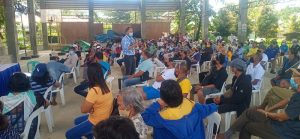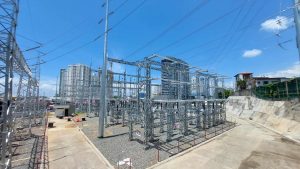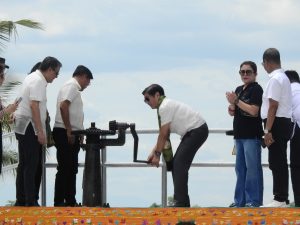
SAN FRANCISCO, Agusan del Sur (MindaNews) — At 79, Conrada Ente, an agrarian reform beneficiary (ARB) who will reportedly own at least three hectares of farmland inside the 3,000-hectare oil palm plantation here, is eager to receive an individual land title that she can hand over to her two farmer-sons when she is gone.
“It’s good that it will finally become a reality so that my two sons would tend it for our livelihood. I would be happy to turn it over to them before I die,” Ente said in Cebuano during the four-day orientation for ARBs on Support to Parcelization of Lands for Individual Titling (SPLIT) Project of the Department of Agrarian Reform.
They were once farmworkers of the oil palm plantation owned by a multinational company NDC-Guthrie Plantations, Inc. (NGPI) since the early 1980s.
The ARBs waited 33 years to get individual Certificate of Land Ownership Award (CLOA) titles after DAR through the Comprehensive Agrarian Reform Program (CARP) converted the wide tract of oil palm plantation into ARB lands in 1988 but awarded it through a collective CLOA entrusted to ARB cooperatives.
Still poor
While waiting for the land title, Ente’s family is eking out a living by receiving a measly 3,000 pesos every three months as her share from the harvested oil palm fruits by their NGPI ARBs Multi-Purpose Cooperative.
She inherited the ARB membership after her husband Doroteo, who used to be the supervisor of the oil palm company, fell ill and died in 2011.
The hardships experienced by the Entes are shared by other ARB cooperative members who did not enjoy the fruits of their land ownership of still productive oil palm plantation areas. Some parts of the land were rented by the new company, Filipinas Palm Oil Plantations, Inc. (FFFPI), and other parts are maintained by different factions of cooperatives.
After the oil palm plantations were awarded to ARBs who were originally divided into two main cooperative groups in 1988, these groups enjoyed huge payments from the lease by the company of their lands.
Infighting
But years later, infighting among leaders of the two cooperatives after they received millions of pesos on the yearly lease pay and misunderstanding on their moves to ask for an increase in land rentals led to a split into five different groups with different approaches in giving their profit-sharing on their livelihood proceeds.
On their part, Ente, who belong to the remnants of the original NGPI Multi-Purpose Cooperative led by Nestor Alcular, were just given 40 percent of their profit share while the 60 percent were intended for the day-to-day operations and the salaries of office and field workers.
The Alcular group operated their farmlands through a group of clusters and their produce would depend on how productive each cluster is.
This scheme however led to dissatisfaction of members who get measly shares and reportedly led to the killing of cluster leader Dionisio Cabatuan on Sept. 25.
Leaders of NGPI ARBs MPC have opposed the SPLIT project since it was implemented early this year.
Raul Batiao, manager of the cooperative, said collective ownership of ARB lands is favorable for the cooperative to productively operate and improve the lives of its members.
Different mandate
Provincial DAR officials made the clarification on the benefits of the individual titling of CLOAs through the SPLIT project saying this implementation is the ultimate mandate of CARP.
Allan Mundala, Provincial Agrarian Reform Officer, said the DAR which implements CARP is more focused on the individual distribution of lands to ARBs and it is the mandate of the Cooperative Development Authority (CDA) to resolve the problems of cooperatives.
Mundala also clarified that awarding of individual CLOAs will not affect the ARBs affiliation with their respective cooperatives. “DAR has its own laws to follow, CDA has its own laws to follow,” he said.
Jamil Amantoding Jr., Provincial Agrarian Reform Program Officer II, told ARBs who attended the orientation that after the SPLIT project is fully implemented in the next three years, there will no longer be individual titling of lands to the landless farmers.
He projected that individual CLOAs will be awarded to oil palm plantations ARBs in the first quarter of next year.
The ARBS of the oil palm plantations have been the priority in the implementation of the SPLIT project since they are the models of CARP through Republic Act 6657 which sought to redistribute lands not only to farmers and farm workers but also to the landless poor.
The late President Corazon Aquino personally distributed the collective CLOAS to the ARB cooperatives of NGPI in 1988.
Security of tenure
The SPLIT project, which is one of the DAR’s major ventures being implemented nationwide, aims to improve the security of tenure and strengthen the property rights of ARBs through the subdivision of CLOAs previously issued collectively by the agency.
Some 1,143 ARBs who are owners of the collective CLOAs of 3,000 hectares attended the four-day orientation.
In 2016, the NGPI returned the land to the ARBs due to internal conflict within the cooperative.
Amatonding hopes that after the series of orientation activities, DAR-Agusan del Sur will be able to start the field validation activities, a requisite for the delineation of the collective CLOAs.
Throughout its four-year implementation, the SPLIT Project will cover around 54,000 hectares with 3,174 collective CLOAs that will benefit some 25,000 ARBs in Agusan del Sur, (Chris V. Panganiban / MindaNews)



